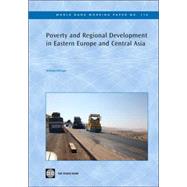Poverty and Regional Development in Eastern Europe and Central Asia
, by Dillinger, William R.- ISBN: 9780821371619 | 0821371614
- Cover: Paperback
- Copyright: 7/1/2007
Regional economic development is an interest of policymakers throughout the Europe and Central Asia (ECA) region. One of its principal aims is to reduce poverty in lagging regions by stimulating local economic growth. However, problems exist with this approach. First, it may miss the target. Although geographical concentrations of poverty exist, poor people also live in regions that are-on average-rich. Second, the sources of the problem may be misdiagnosed. Poverty is not only related to where people are, but to who people are. In ECA, poverty is associated with low levels of education and people who are too young or too old to participate in the labor force. Under these circumstances, efforts to bring higher wage employment opportunities to poor regions may have little immediate benefit for the people who live there. Third, relying on regional economic development to address poverty in lagging regions ignores the potential role of migration. The emigration of labor, rather than the immigration of capital, may be a more effective means of reducing the poverty of individuals in lagging regions, though this is unlikely to eliminate pockets of poverty quickly.Development opportunities may exist in poor regions that markets have overlooked. Interventions must be assessed carefully. Some of the traditional instruments used to stimulate regional economic growth have mixed track records. Comprehensive custom-tailored approaches appear to be a promising alternative. However, governments should be modest in using regional development as a tool of poverty reduction. Policies aimed at stimulating growth in poor regions should be complemented by more direct anti-poverty measures, including targeted transfers and investments in education, and efforts to remove barriers to emigration.







